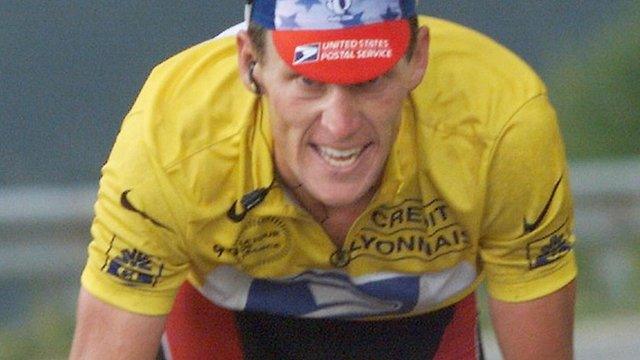Lance Armstrong: Brian Cookson should have banned Astana
- Published
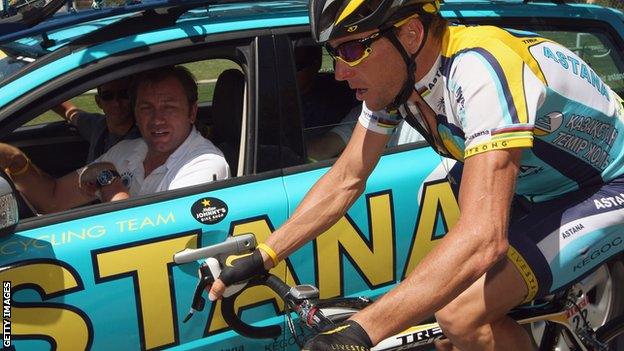
Lance Armstrong rode for Astana on his return to the sport in 2009
Lance Armstrong believes Brian Cookson has not delivered on his campaign promises since taking over at the International Cycling Union (UCI).
Cookson, the ex-head of British Cycling, beat Ireland's Pat McQuaid in a bitter election in late 2013.
But Armstrong is unimpressed with what he has seen of the president so far.
"If McQuaid had made the same decisions Cookson has made in his first year, he would have been lynched," said the disgraced cyclist.
"Do we like what we have got so far?"
Armstrong cited the decisions to "rush" through Team Sky's request for Chris Froome to get emergency steroid treatment for asthma after the Tour de Romandie's prologue and Cookson's handling of the Astana affair as failures to signal a new direction at the top of the sport.
Armstrong on drugs, history and the future
Astana, the team for which Armstrong rode during his second comeback in 2009, have been mired in controversy ever since five riders in their system failed drugs tests in a matter of months last year.
Many observers expected the UCI to revoke the team's WorldTour licence but after weeks of speculation the Kazakhstan-based outfit were given another chance in December.
Run by Alexander Vinokourov, a contemporary of Armstrong's, Astana remain on probation and their anti-doping practices are being independently vetted, but the episode was widely seen as a challenge that Cookson ducked.
And with Tour de France champion Vincenzo Nibali riding for Astana, the sport had once again left itself vulnerable to ridicule.
Speaking to the BBC in his first TV interview for two years, Armstrong said "everybody thinks" Astana should have been thrown out, but he accepted that Cookson's hands might have been tied by the UCI's rules.
He was less understanding, though, on the 63-year-old's failure to force the likes of Vinokourov, Tinkoff-Saxo's Bjarne Riis and other controversial team managers still in the sport, to cooperate with the panel set up by the UCI to investigate the sport's murky past.
Armstrong has talked to the Cycling Independent Reform Commission (Circ) twice and is now waiting to see if his efforts will be rewarded with a recommendation that his lifetime ban from sport should be reduced.
That ban was given out by the United States Anti-Doping Agency (Usada) in 2012 when Armstrong failed to cooperate with its investigation into the teams with whom he won his seven Tour de France titles. He was also stripped of those victories.
Any decision on reducing the ban rests with Usada, which might mean Armstrong is left disappointed, but he is angry that his peers have not been compelled to talk to Circ.
"If I'm Brian Cookson, I would make it a deal point that you have to come in and talk," he said.
"So if Riis doesn't talk to you, or Vinokourov doesn't, there should be consequences. I don't know those to be examples, but I can imagine.
"If you don't come in to talk, you don't just get passed."
When asked for a reaction, Riis's team Tinkoff-Saxo said he has never refused to meet Circ and it wanted to respect the confidentiality of the process, while the UCI said it would wait until Circ's report is finished before commenting.
The three-man panel is expected to complete its year-long investigation in the coming weeks, with the UCI publishing it by the end of February.
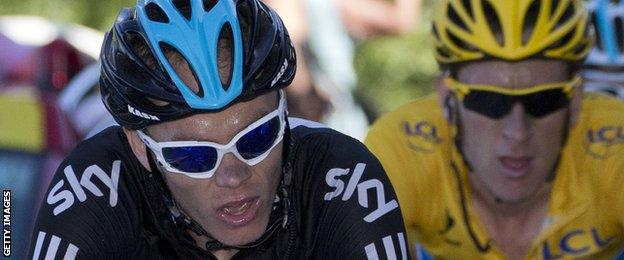
Chris Froome won the Tour de France in 2013, 12 months after Team Sky colleague Sir Bradley Wiggins
While Armstrong is underwhelmed by Britain's takeover at the UCI, he is far more conciliatory to the British riders who have followed him as Tour champions, Sir Bradley Wiggins and Chris Froome, particularly in relation to the doping questions they have had to face in his wake.
"I'm sorry, and I completely agree that because of the timing of things, it is down to me," he said.
"[Usada's reasoned decision] comes out after the Tour in 2012, so it's logical that in 2013 there's going to be a lot of questions. Especially in a year when Chris Froome performs exceptionally.
"Look, Froome won the Tour in 2013, that's 14 years after 1999. If in 1999 I was asked questions about the 1985 winner of the Tour de France, I'd be like 'What are you talking about? Why are you asking me about the mid-80s?'
"But the story was so relevant to people. When this went down, people were left with the impression, in 2012, that I was hanging blood bags six months earlier. That's not the case.
"So I feel bad for those guys, they shouldn't have been put in that position. I'm not sure why they were put in a position to answer 15-year-old questions, but it's unfortunate for all of us, especially for them."
- Published26 January 2015
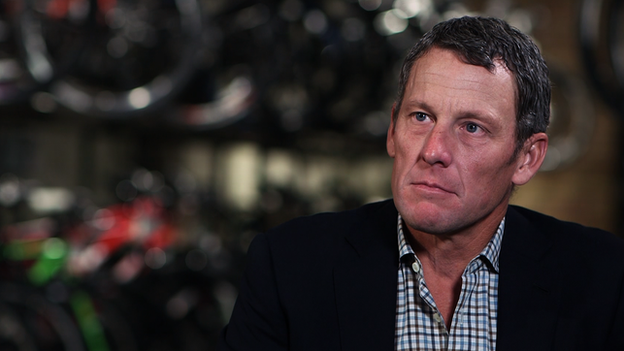
- Published26 January 2015
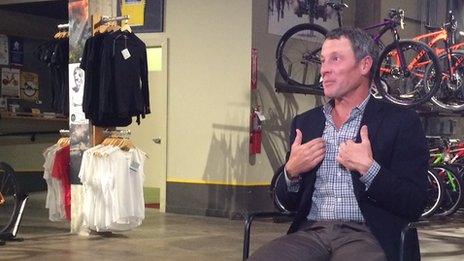
- Published26 January 2015
- Published27 January 2015
